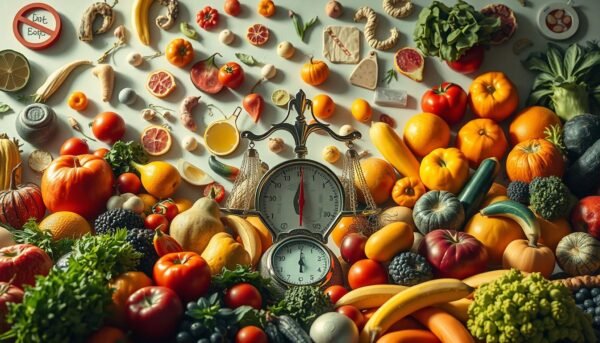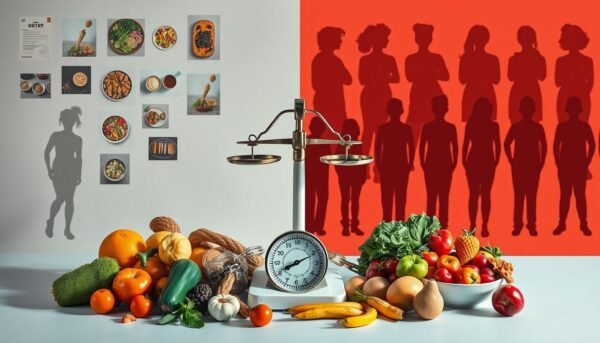Have you ever felt stuck in the diet cycle, only to see weight loss fade away? You’re not alone. Diet culture harms our minds and bodies for too long. But, there’s a way to get your health and happiness back without diet culture’s false promises.
In this guide, we’ll explore diet culture’s impact on society and our lives. We’ll learn about its beliefs and how to spot disordered eating signs. You’ll get the tools to break free and live a healthier life.

Let’s challenge the diet culture together. We’ll reject wellness industry lies and find true well-being. We’ll uncover diet culture’s dangers and guide you to a better health path. Are you ready to start?
Understanding Diet Culture and Its Impact on Society
Diet culture is a system that links thinness to health and success. It often leads to harmful behaviors like negative comments about weight. It also makes people assign self-worth to their body size.
Restrictive eating or excessive exercise is often justified. Diet culture’s impact on mental health is significant. It creates a black-and-white view of nutrition, leading to guilt, shame, and a troubled relationship with food and body.
The System of Beliefs Behind Diet Culture
At the heart of diet culture is the belief that being thin is the ultimate goal. It believes weight loss is key to health and happiness. This mindset ignores genetics, socioeconomic status, and overall well-being, focusing only on weight loss.
The weight loss industry, worth $160 billion in the U.S., supports these beliefs. It offers a cycle of “quick fixes” and unrealistic expectations.
How Diet Culture Affects Mental Health
The pressure to meet narrow beauty standards can harm mental health. A 2019 study showed that university students with eating disorder symptoms felt campus diet culture made things worse. Orthorexia nervosa, an unhealthy obsession with “pure” eating, is linked to diet culture’s harmful ideals.
The Role of Social Media in Perpetuating Diet Culture
Social media plays a big role in diet culture. A 2020 review found that certain content, like images of unrealistic body types, can harm body image, especially in young females. This constant exposure can make people feel inadequate, lower self-esteem, and increase the risk of disordered eating.

Understanding diet culture’s beliefs and mechanisms is key to challenging these harmful norms. We should focus on overall health and well-being, not just beauty standards. Embracing size diversity, rejecting weight-centric approaches, and seeking support from intuitive eating and Health At Every Size professionals are important steps to break free from diet culture.
The Hidden Dangers of Wellness Industry Marketing
The wellness industry often promotes practices that can cause more harm than good. It lacks pre-market safety testing on supplements. Influencers and functional medicine providers make unfounded claims. Social media algorithms push users towards wellness misinformation.
These marketing tactics exploit people’s distrust in traditional medicine. They lead to potentially harmful alternatives.
About half of adults in the U.S. have tried to lose weight in the last year. Yet, 98% of diets fail to help people keep the weight off. The average American adult woman is around 18-20, according to the CDC.
The wellness industry pushes an unrealistic beauty standard. Barbie’s small waist and thigh gap are just one example.
The wellness industry’s marketing can be dangerous. A 2015 study showed that a 1,200-calorie diet is close to starvation. Yet, the industry keeps promoting such diets.
Lululemon’s founder made comments about women’s thighs touching. This reflects harmful body image standards that can hurt mental health.
The wellness industry’s influence goes beyond physical health. Diet culture is linked to mental health issues like anxiety and sadness. It can also lead to eating disorders like binge eating and anorexia.
It’s time to examine the wellness industry’s marketing closely. By recognizing the dangers and embracing inclusivity, we can move away from diet culture. This will help promote true well-being for everyone.
Recognizing Common Signs of Disordered Eating Patterns
Disordered eating is when people eat in ways that seem healthy but aren’t. It’s not just about eating disorders like anorexia or bulimia. But, it can still harm your body and mind. Knowing the signs helps us stop it before it gets worse.
Physical and Emotional Signs to Watch For
Signs of disordered eating include being too focused on food and dieting a lot. You might also binge eat, fast too much, skip meals, or avoid certain foods. This can lead to weight changes, stomach problems, and irregular periods.
Feeling anxious or guilty about food is also a sign. You might feel sad or want to be alone more often.
Breaking the Cycle of Restriction and Guilt
Fad diets can make you miss out on important nutrients. They can also make you feel bad about food. Stress, anxiety, and feeling not good enough can make eating disorders worse.
Getting help is key to breaking this cycle. It’s about recognizing the problem and seeking support.
Understanding Your Relationship with Food
Disordered eating can happen to anyone, at any age. It’s influenced by genetics, psychology, social pressures, and past traumas. By understanding these factors, we can work towards a healthier relationship with food.

Moving Beyond Weight-Centric Health Approaches
We often get stuck in the idea that health is just about weight. This view ignores the many aspects of well-being. It focuses too much on body size, which can harm us physically and mentally.
“Health at Every Size” (HAES) is a better way. It supports size diversity and focuses on healthy behaviors, not just losing weight. This lets us see health in a more complete way.
Weight-centric views have serious downsides. For example, hospitalizations for eating disorders in men rose by 53% from 1999 to 2009. Also, 89% of teen girls have dieted by age 17. These numbers show we need a new way to think about health.
HAES offers a positive change. It shows that enjoying food and moving can improve health. This approach helps us have a better body image and live healthier lives.
We must also fight against harmful beauty standards. By valuing ourselves, we can avoid the pressure to look a certain way. With support from health experts and a community that values size diversity, we can find true wellness.

Adopting a weight-inclusive view is key to real health. It lets us see that health is more than just weight. This opens up new possibilities for living well, no matter our size.
Embracing Intuitive Eating Principles
Intuitive eating helps us connect with food naturally. It lets us listen to our body and enjoy all foods. This way, we can move away from diet rules and find a better way to eat.
Learning to Honor Your Hunger
Intuitive eating starts with listening to hunger. We should eat when we’re hungry, not when we’re very hungry or not at all. This way, we treat our body with kindness.
Making Peace with All Foods
Intuitive eating means accepting all foods. We stop thinking some foods are better than others. This helps us avoid feeling guilty about what we eat.
Discovering Satisfaction in Eating
It’s important to enjoy our meals. We should pay attention to how food tastes and feels. This makes eating a positive experience.
Intuitive eating helps us see food in a new light. It’s not about being perfect. It’s about listening to our body and enjoying food.

Ready to start this journey? Call our intuitive eating dietitians at (919-237-1337, option 4). They can help you find a healthier way to eat.
Building a Sustainable Approach to Well-being
Embracing a sustainable approach to well-being means fighting against diet culture. It’s about looking at our personal food rules and how they affect us. By moving away from weight and beauty standards, we can have a better relationship with food and our bodies.
The anti-diet movement helps us leave behind old dieting ways. It’s about focusing on health and happiness, not just weight. Getting help from dietitians and therapists can guide us to eat more intuitively. This way, we can stop feeling guilty about food.
Building a sustainable approach to well-being is complex. It involves understanding how our genes, emotions, and society affect our food and body relationship. It’s about accepting ourselves, our bodies, and the diversity of human forms. By focusing on well-being, not just dieting, we can live a more fulfilling life.
This post may contain affiliate links which means I may receive a commission for purchases made through links. I will only recommend products that I have personally used! Learn more on my Private Policy page.